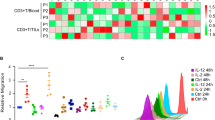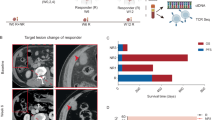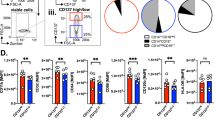Abstract
Cytotoxicity is an important function of the immune system that results in the destruction of cellular targets by humoral and/or cellular mechanisms. We wanted to assess the possibility of targeting the lytic function of immune cells toward cancer cells, which express the gene coding for a known tumor antigen (Ag) (GA733-2/epithelial cell adhesion molecule), using a viral vector encoding a monoclonal antibody (mAb) specific for said tumor Ag (CO17-1A). To this end, we have constructed recombinant vaccinia viruses expressing the sequences corresponding to mAb CO17-1A, which recognizes a specific Ag (GA733-2) that is present on the surface of most gastrointestinal carcinomas. The recombinant vectors encoding either a secreted or membrane-anchored form of CO17-1A mAb were used to infect effector cells, which were subsequently assessed for their cytotoxic activity. The recombinant viruses were able to infect both granulocyte-macrophage colony-stimulating factor-activated human macrophages and Ag-stimulated murine cytotoxic T lymphocytes. Infected granulocyte-macrophage colony-stimulating factor-activated macrophages were found to be able to kill GA733-2-expressing tumor cells. Likewise, infected cytotoxic T lymphocytes, although conserving their original alloreactivity, gained the capability of killing GA733-2-expressing cancer cells.
This is a preview of subscription content, access via your institution
Access options
Subscribe to this journal
Receive 12 print issues and online access
$259.00 per year
only $21.58 per issue
Buy this article
- Purchase on SpringerLink
- Instant access to full article PDF
Prices may be subject to local taxes which are calculated during checkout
Similar content being viewed by others
Author information
Authors and Affiliations
Corresponding author
Rights and permissions
About this article
Cite this article
Paul, S., Bizouarne, N., Dott, K. et al. Redirected cellular cytotoxicity by infection of effector cells with a recombinant vaccinia virus encoding a tumor-specific monoclonal antibody. Cancer Gene Ther 7, 615–623 (2000). https://doi.org/10.1038/sj.cgt.7700161
Received:
Accepted:
Published:
Issue date:
DOI: https://doi.org/10.1038/sj.cgt.7700161
Keywords
This article is cited by
-
T cell avidity and tumor recognition: implications and therapeutic strategies
Journal of Translational Medicine (2005)
-
Tumor gene therapy by MVA-mediated expression of T-cell–stimulating antibodies
Cancer Gene Therapy (2002)



